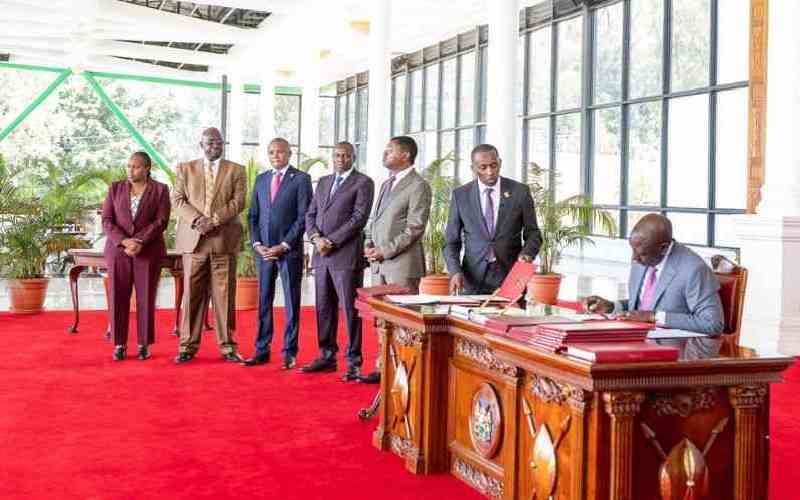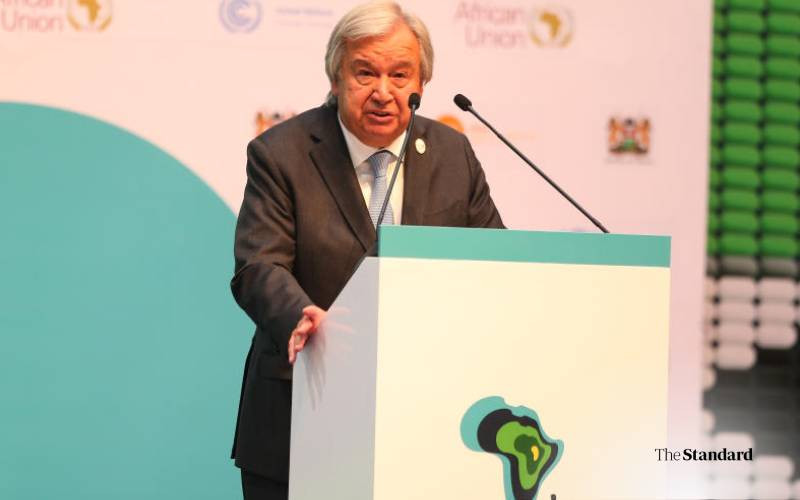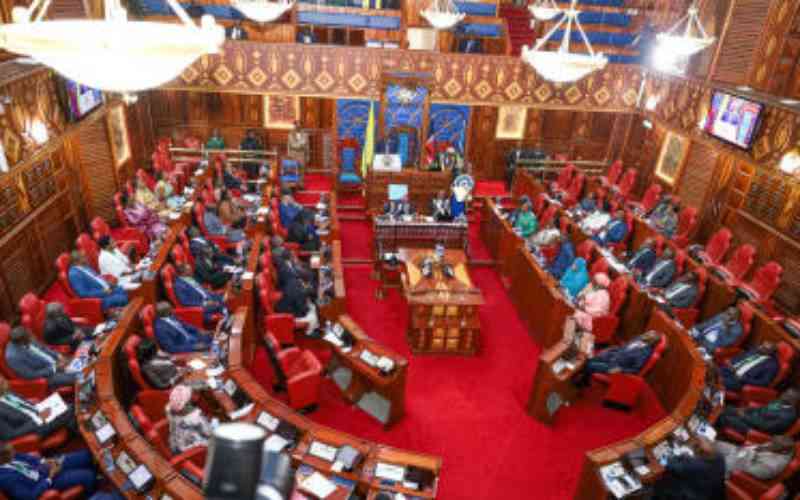President William Ruto yesterday quietly assented into law seven parliamentary Bills that seek to fast-track the achievement of the mandates of the Kenya Kwanza regime.
The Bills are the Kenya Revenue Authority (Amendment) Bill 2024, the Kenya Roads (Amendment) Bill 2024, the Ethics and Anti-Corruption Commission (Amendment) Bill 2024 and the Statutory Instruments (Amendment) Bill 2023.
Others are the Tax Procedures (Amendment) Bill 2024, the Tax Laws (Amendment) Bill 2024 and the Business Laws (Amendment) Bill 2024,
The Bills were among the business prioritised by the House last week before it proceeded on recess. In what turned out to be an expedited exercise, leaders from across the political divide expressed support for the Bills and voted for their passage through the third reading stage in the August House. During a sitting that extended to almost 9 PM, close to 65 MPs unanimously described the new laws as progressive.
Notably, prior to the passage of the Bill, the National Assembly Committee on Finance and National Planning had concluded public participation on November 28, and by the next sitting on December 3, a report had been tabled before the House for consideration. MPs then proceeded to debate the Bills on December 4.
“We have passed very progressive laws. The payslips of Kenyans are now going to look better because of the allowances we have given on these statutory deductions. Our pensioners will get rebates from pension payments, and people can now contribute to their post-medical insurance. We have also ensured that data and airtime will continue to be affordable in this country,” Finance committee chair Kimani Kuria said.
“These reports have demonstrated again that public participation was not an exercise in futility. The views we collected from Kenyans, we have tried to the best extent possible to accommodate them,” he added.
Majority Leader Kimani Ichungwah, who had introduced a substantial number of the Bills, spoke up for the MPs regarding their continued support of the government agenda, noting that their actions would benefit future generations.
“The way to encourage investors to come to our country is to have laws and legislate laws that will enable them to invest and assure them that they will have raw materials and a ready market.”
“I am so proud of this House, Mr. Speaker, that we have all in one accord passed laws that serve the parts of the nation now and for future generations,” he added.
Leader of Minority Junet Mohammed asserted that the tax laws were exactly what the country needed at this time.
“This tax bill is one that this country needed at this point in time. Our economy is on an upward trajectory, inflation is at 2.7 percent. The forex exchange has been stabilized to around one hundred and twenty something. The cost of living has come down…we want to make sure that our lives are better than this, and that is why we are here to pass the right laws—not as the majority and minority but as Parliament,” he said.
“I expect the President to sign this Bill into law expeditiously so that Kenyans can enjoy its benefits,” he added.
Notably, the Tax Laws Amendment Bill was passed by the House on December 4, with amendments. The same was true for the Tax Procedures Amendment Bill, the Business Amendment Laws, and the Statutory Instruments (Amendment) Bill.
However, the EACC Amendment Bill 2024 and the Kenya Roads Board Amendment Bill were passed on November 28. Further, the Kenya Roads Board (Amendment) Bill was passed on November 27.
Stay informed. Subscribe to our newsletter
The laws, seen as seen as key cogs towards the attainment of the Bottom-Up Economic transformation agenda have introduced key amendments to existing Acts. The Tax Laws (Amendment) Act 2024 for instance, will enable the government to generate some of the revenue lost after the collapse of the Finance Bill, 2024 while providing relief to employees, retirees and businesses.
“The principal object of the Bill, introduced by National Assembly Majority Leader Kimani Ichung’wah, was to amend the provisions of four Acts of Parliament, namely, the Income Tax Act (Cap. 470), the Value Added Tax (VAT) Act (Cap. 476), the Excise Duty Act (Cap. 472) and the Miscellaneous Fees and Levies Act (Cap. 469C),” said a brief from Parliament on the Bills before their signing yesterday.
Amendments to the Income Tax Act allow the Affordable Housing Levy (AHL) and contributions to post-retirement medical funds to be deducted from the payable tax liability. This addresses the issue of double taxation and allows taxpayers to enjoy the full benefits of their AHL and post-retirement medical funds contributions, according to the brief by Parliament.
Enactment of the law also means the deductible interest limit for mortgages has increased from Sh300,000 to Sh360,000.
As a result, individuals can now deduct a higher amount of interest paid on loans for the purchase or improvement of their residential properties when calculating their taxable income.
This is expected to incentivise home ownership and is aligned with the housing and settlement pillar of the Bottom-up Economic Transformation Agenda (BETA).
The law increases the amount deductible for contributions to registered pension or provident funds from the tax liability of individuals and employers to encourage a saving culture for retirement purposes while, at the same time, it enhances the benefits provided by employers to employees of meals, non-cash and gratuity and similar payments that are exempt from tax.
However, to recoup some of the revenues lost when the Finance Bill 2024 was withdrawn following the Gen Z protests, Parliament has retained the National Treasury’s proposal of a Significant Economic Presence Tax at an effective rate of six per cent for non-residents.
Additionally, the Act introduces the Minimum Top-Up Tax at a minimum effective tax rate of 15 per cent.
The State argues that two new taxes align the taxation of digital services with international best practice, and the taxation of multinationals with the global practice to prevent tax base erosion, respectively.
Treasury Cabinet Secretary John Mbadi had initially promised to retain the tax at three per cent, as was the case with the Digital Service Tax, which has now been replaced, following concerns from industry players and experts on its impact.
The Tax Procedures (Amendment) Act 2024 simplifies compliance for small businesses and small-scale farmers by providing for reverse ticketing where the purchaser will be the one to issue a tax invoice for the purpose of ascertaining tax liability.
This will apply to businesses whose turnover does not exceed five million shillings. The amendments also seek to provide clarity and simplify compliance for small businesses and small-scale farmers.
The law has also restored import duty on certain raw materials to cushion local steel manufacturers from cheap imports and create local jobs for at least two years concerning specified items.
According to the government, the amendment incentivises the growth of the local steel and construction industry. Analysts said earlier that economic pressure on the Treasury had prompted the Tax Laws (Amendment) Bill, 2024, and the Tax Procedures (Amendment) (No.2) Bill, 2024.
“In simple terms, these bills seek to address Kenya’s fiscal deficit by broadening the tax base, improving compliance, and aligning with international tax standards,” said Alex Kanyi and Lena Onyango, partners at law firm Cliffe Dekker Hofmeyr (CDH) Kenya. “While these proposals reflect the evolving economic and governance landscape, they also raise questions about their potential to create sustainable revenue streams.” In a further relief to retirees, payments of pension benefits from registered funds to individuals upon reaching retirement age will be tax-exempt.
Individuals who retire early due to health reasons or withdraw from the fund after 20 years of membership will also be exempted from taxes on their pension benefits. In addition, it exempts the payment of gratuity and a retirement annuity from taxation.
Other laws that Ruto signed yesterday also have significant implications for business operations. In passing the Business Laws (Amendment) Bill 2024, the National Assembly offered a reprieve to small banks by staggering the requirement to raise their core capital to Sh10 billion. The new law will now require banks and mortgage financing institutions to raise their core capital gradually within five years, eventually reaching a minimum of Sh10 billion by 2029.
Additionally, it grants the Central Bank of Kenya the authority to impose sanctions on organisations or individuals who fail to comply with the prudential guidelines of up to a maximum fine of Sh20 million, or three times the financial gain from the breach, whichever is higher.
“These amendments shall promote financial stability and protect depositors from systemic risks by ensuring banks adhere to adequate core capital requirements,” the National Assembly brief says.
The Kenya Bankers Association and other industry players had expressed fear that several banks would be forced to close shop or merge to meet the National Treasury’s requirement of raising the core capital from the current Sh2 billion to Sh10 billion at a go. The KRA (Amendment) Act 2024 provides for the appointment of deputy Commissioners by the Commissioner General. However, the appointments will be subject to the approval of the board.
[email protected]

























